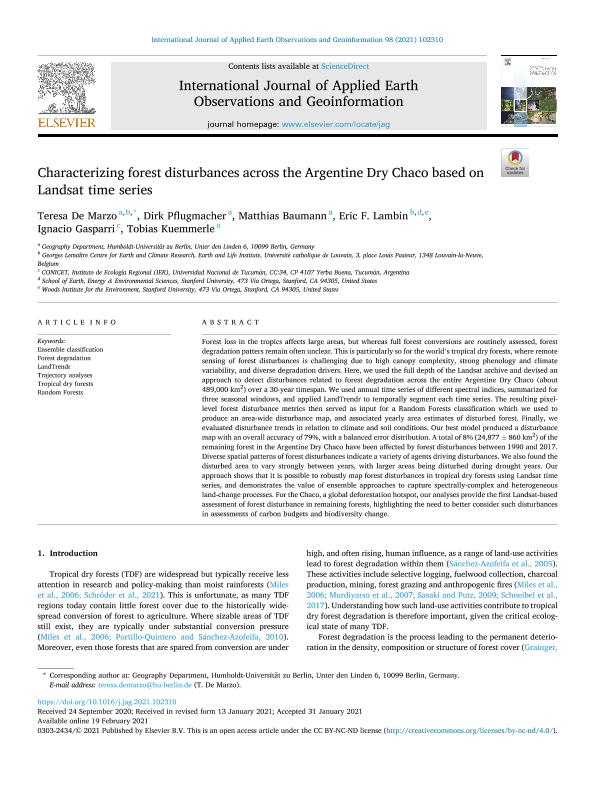Mostrar el registro sencillo del ítem
dc.contributor.author
De Marzo, Teresa
dc.contributor.author
Pflugmacher, Dirk
dc.contributor.author
Baumann, Matthias

dc.contributor.author
Lambin, Eric F.
dc.contributor.author
Gasparri, Nestor Ignacio

dc.contributor.author
Kuemmerle, Tobias

dc.date.available
2023-01-10T12:13:01Z
dc.date.issued
2021-06
dc.identifier.citation
De Marzo, Teresa; Pflugmacher, Dirk; Baumann, Matthias; Lambin, Eric F.; Gasparri, Nestor Ignacio; et al.; Characterizing forest disturbances across the Argentine Dry Chaco based on Landsat time series; Elsevier Science; Itc Journal; 98; 102310; 6-2021; 1-13
dc.identifier.issn
0303-2434
dc.identifier.uri
http://hdl.handle.net/11336/184076
dc.description.abstract
Forest loss in the tropics affects large areas, but whereas full forest conversions are routinely assessed, forest degradation patters remain often unclear. This is particularly so for the world's tropical dry forests, where remote sensing of forest disturbances is challenging due to high canopy complexity, strong phenology and climate variability, and diverse degradation drivers. Here, we used the full depth of the Landsat archive and devised an approach to detect disturbances related to forest degradation across the entire Argentine Dry Chaco (about 489,000 km2) over a 30-year timespan. We used annual time series of different spectral indices, summarized for three seasonal windows, and applied LandTrendr to temporally segment each time series. The resulting pixel-level forest disturbance metrics then served as input for a Random Forests classification which we used to produce an area-wide disturbance map, and associated yearly area estimates of disturbed forest. Finally, we evaluated disturbance trends in relation to climate and soil conditions. Our best model produced a disturbance map with an overall accuracy of 79%, with a balanced error distribution. A total of 8% (24,877 ± 860 km2) of the remaining forest in the Argentine Dry Chaco have been affected by forest disturbances between 1990 and 2017. Diverse spatial patterns of forest disturbances indicate a variety of agents driving disturbances. We also found the disturbed area to vary strongly between years, with larger areas being disturbed during drought years. Our approach shows that it is possible to robustly map forest disturbances in tropical dry forests using Landsat time series, and demonstrates the value of ensemble approaches to capture spectrally-complex and heterogeneous land-change processes. For the Chaco, a global deforestation hotspot, our analyses provide the first Landsat-based assessment of forest disturbance in remaining forests, highlighting the need to better consider such disturbances in assessments of carbon budgets and biodiversity change.
dc.format
application/pdf
dc.language.iso
eng
dc.publisher
Elsevier Science

dc.rights
info:eu-repo/semantics/openAccess
dc.rights.uri
https://creativecommons.org/licenses/by-nc-nd/2.5/ar/
dc.subject
ENSEMBLE CLASSIFICATION
dc.subject
FOREST DEGRADATION
dc.subject
LANDTRENDR
dc.subject
RANDOM FORESTS
dc.subject
TRAJECTORY ANALYSES
dc.subject
TROPICAL DRY FORESTS
dc.subject.classification
Geografía Física

dc.subject.classification
Ciencias de la Tierra y relacionadas con el Medio Ambiente

dc.subject.classification
CIENCIAS NATURALES Y EXACTAS

dc.subject.classification
Otras Ciencias de la Computación e Información

dc.subject.classification
Ciencias de la Computación e Información

dc.subject.classification
CIENCIAS NATURALES Y EXACTAS

dc.subject.classification
Ecología

dc.subject.classification
Ciencias Biológicas

dc.subject.classification
CIENCIAS NATURALES Y EXACTAS

dc.title
Characterizing forest disturbances across the Argentine Dry Chaco based on Landsat time series
dc.type
info:eu-repo/semantics/article
dc.type
info:ar-repo/semantics/artículo
dc.type
info:eu-repo/semantics/publishedVersion
dc.date.updated
2022-04-21T19:19:39Z
dc.identifier.eissn
1872-826X
dc.journal.volume
98
dc.journal.number
102310
dc.journal.pagination
1-13
dc.journal.pais
Países Bajos

dc.journal.ciudad
Ámsterdam
dc.description.fil
Fil: De Marzo, Teresa. Université Catholique de Louvain; Bélgica. Humboldt-Universität zu Berlin; Alemania
dc.description.fil
Fil: Pflugmacher, Dirk. Humboldt-Universität zu Berlin; Alemania
dc.description.fil
Fil: Baumann, Matthias. Humboldt-Universität zu Berlin; Alemania
dc.description.fil
Fil: Lambin, Eric F.. Université Catholique de Louvain; Bélgica. University of Stanford; Estados Unidos
dc.description.fil
Fil: Gasparri, Nestor Ignacio. Universidad Nacional de Tucumán. Facultad de Ciencias Naturales e Instituto Miguel Lillo; Argentina. Universidad Nacional de Tucumán. Instituto de Ecología Regional. Consejo Nacional de Investigaciones Científicas y Técnicas. Centro Científico Tecnológico Conicet - Tucumán. Instituto de Ecología Regional; Argentina
dc.description.fil
Fil: Kuemmerle, Tobias. Humboldt-Universität zu Berlin; Alemania
dc.journal.title
Itc Journal

dc.relation.alternativeid
info:eu-repo/semantics/altIdentifier/url/https://www.sciencedirect.com/science/article/pii/S0303243421000179
dc.relation.alternativeid
info:eu-repo/semantics/altIdentifier/doi/http://dx.doi.org/10.1016/j.jag.2021.102310
Archivos asociados
